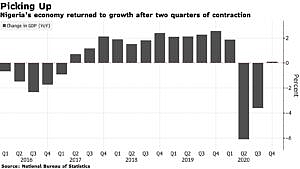Nigeria’s economy unexpectedly came out of a recession in the fourth quarter as growth in agriculture and telecommunications offset a sharp drop in oil production.
Gross domestic product grew 0.11% in the three months through December from a year earlier, compared with a decline of 3.6% in the third quarter, the Abuja-based National Bureau of Statistics said on its website on Thursday. The median estimate of five economists in a Bloomberg survey was for a quarterly decline of 1.86%. The economy contracted 1.92% for the full year, the most since at least 1991, according to International Monetary Fund data.
Picking Up
Oil production fell to 1.56 million barrels a day in the fourth quarter from 1.67 million barrels in the previous three months. While crude contributes less than 10% to the country’s GDP, it accounts for nearly all foreign-exchange earnings and half of government revenue in the continent’s biggest producer of the commodity.
The government’s forecast for growth of 3% this year is double that of the IMF. The lender has warned a slow roll-out of Covid-19 vaccines could threaten the economy’s recovery.
The non-oil economy expanded by 1.7% from a year earlier, the strongest rate in four quarters, with agriculture growing 3.4% and telecommunications increasing 17.6%.
 A stronger recovery could ease pressure on the central bank to stoke activity, paving the way for a renewed focus on its price stability mandate. That means the monetary policy committee could start raising interest rates again to fight inflation that’s been above the target band of 6% to 9% for more than five years. The panel eased by 200 basis points in 2020.
A stronger recovery could ease pressure on the central bank to stoke activity, paving the way for a renewed focus on its price stability mandate. That means the monetary policy committee could start raising interest rates again to fight inflation that’s been above the target band of 6% to 9% for more than five years. The panel eased by 200 basis points in 2020.
The government’s forecast for growth of 3% this year is double that of the IMF. The lender has warned a slow roll-out of Covid-19 vaccines could threaten the economy’s recovery.
“The fact that we have seen a recovery in non-oil GDP growth is positive,” said Razia Khan, chief economist for Africa and the Middle East at Standard Chartered Bank. “However, the headwinds associated with the second wave of Covid-19 may still be considerable.”
– Bloomberg



